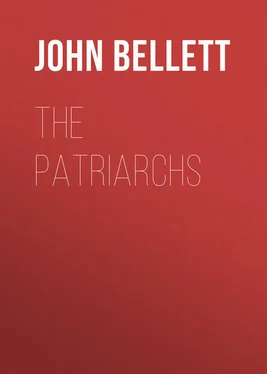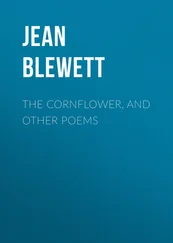John Bellett - The Patriarchs
Здесь есть возможность читать онлайн «John Bellett - The Patriarchs» — ознакомительный отрывок электронной книги совершенно бесплатно, а после прочтения отрывка купить полную версию. В некоторых случаях можно слушать аудио, скачать через торрент в формате fb2 и присутствует краткое содержание. Жанр: foreign_antique, foreign_prose, Биографии и Мемуары, на английском языке. Описание произведения, (предисловие) а так же отзывы посетителей доступны на портале библиотеки ЛибКат.
- Название:The Patriarchs
- Автор:
- Жанр:
- Год:неизвестен
- ISBN:нет данных
- Рейтинг книги:4 / 5. Голосов: 1
-
Избранное:Добавить в избранное
- Отзывы:
-
Ваша оценка:
- 80
- 1
- 2
- 3
- 4
- 5
The Patriarchs: краткое содержание, описание и аннотация
Предлагаем к чтению аннотацию, описание, краткое содержание или предисловие (зависит от того, что написал сам автор книги «The Patriarchs»). Если вы не нашли необходимую информацию о книге — напишите в комментариях, мы постараемся отыскать её.
The Patriarchs — читать онлайн ознакомительный отрывок
Ниже представлен текст книги, разбитый по страницам. Система сохранения места последней прочитанной страницы, позволяет с удобством читать онлайн бесплатно книгу «The Patriarchs», без необходимости каждый раз заново искать на чём Вы остановились. Поставьте закладку, и сможете в любой момент перейти на страницу, на которой закончили чтение.
Интервал:
Закладка:
And Adam at once owns all this. Out of the abundance of the heart the mouth speaks. "This is now bone of my bones, and flesh of my flesh," he says, as he received the woman from the hand of the Lord God, owning that all was now complete. The serpent may by-and-by insinuate it to be otherwise. But he is a liar. There is not a flaw in all this estate. No lack, and no exception. Nothing that did not in its way contribute to bless him; and nothing of creature blessedness that was wanting to him.
But all this is at once envied by the great enemy. And he had title to try the stability of it. The nakedness, the unshamed nakedness, of the man and the woman was innocency. Yes, but it was also exposure . The creature was to be proved. Strength of creaturehood was to be tried. And the enemy had title to enter the garden to carry on the trial. He was no trespasser there. The order and purpose of creation made room for him, as well as for Adam himself. The very instrument by which he was to conduct his designs was there already. The tree of knowledge was in the midst of the garden.
The tempter, this serpent that was "more subtil than any beast of the field," was the devil. This is directly told us. Rev. xii. 9; xx. 2. And the scene around us to this hour tells of his victory. "The present evil world," whether in its moral condition or in its circumstances, we get in this chapter iii. And we might have expected this; for the world as it now is has derived itself out of the apostasy of Adam; its character and condition are formed by that great act of rebellion.
The three master-principles which animate "the course" of it-"the lust of the flesh, and the lust of the eyes, and the pride of life" – are here seen to become the springs of moral action in the heart of the woman, as soon as she listened to the devil; for the soul that gives up God must find out other masters, and other resources. And this is the world. The world has no confidence in God, nothing to bind it to Him, nothing to give it rest in Him, no sense of His love and truth. Such has it been since this hour, when man gave ear to the accuser of God. It has therefore found out other objects. God made man upright; but he has sought out many inventions. Eccles. vii. 29.
Conscience, too, is quickened into being. Sin did this. "They knew that they were naked." And it was then, at the hour of its birth, as it is to this hour, an uneasy conscience, a conscience that makes cowards of all who carry it. "I was afraid," says Adam (unable to look at God), "because I was naked." Conscience in man must be of this quality, for it owes its existence to sin. There was no sense of good and evil in him till he sinned; and this sense, thus acquired, must leave him a coward in the presence of the righteous One.
Instinctively they make themselves aprons. This is our doing still. Our common state of guilt makes us shun even our fellow-creatures. We cannot stand inspection even from them. One great and constant effort, in the scene around us every day, is to escape full notice. The apron is still invented. The social system understands and allows this. Indeed, it is maintained by a common consent of this sort. And religion, in its way and measure, as well as the rules and common understanding of society, helps in all this. But "the presence of the Lord God" is a different element from that of the presence of our fellows. No rules which sustain the social system will make that tolerable for a moment. The clothing and the ceremony, the inventions of society, or the good manners that array and adorn it, will be found vanity. All have come short of His glory. Let but the conscience hear the tread of His foot, or the sound of His voice in the garden, and no attempt will be equal to that moment. Even religious inventions will all be vain. They can give no confidence with God, nor turn the current of the heart. With his apron upon him, Adam hides himself among the trees of the garden.
This teaches holy and solemn lessons. But with all this cowardice there is effrontery. "The woman whom thou gavest to be with me, she gave me of the tree." Man lays the mischief down at God's door. He says in effect, "Let God see to it; for the woman is His creature, and He gave her to me;" as he still, in the spirit of his mind, says, "Let God see to it; for the world is His, and He made it." A strange and horrible union! The insolence of the heart charging God, and yet a coward conscience unable to meet Him. The sinner may talk big, and make a noise; he may reason upon God and his own condition, and frame speeches and arguments as well as aprons; but in spite of all he can surround himself with, there he is, like Adam, ashamed of himself, and afraid of God. Man has wronged the blessed God, and avoids Him. He charges Him, and yet is afraid to look in His face while he does so. All this, in spite of himself, witnesses against him. "Out of thine own mouth will I judge thee," the Lord has but to say. And then, as again in the parable, he must be speechless.
Such was the mind of Adam then, and such is human nature still. But if this were his moral condition, what were his circumstances? Just those of man to this hour also. By the sweat of his face he was to get bread, and in the sorrow of his heart to eat of it; and that too in the place of thorns and thistles. And in like sorrow the woman was to bring forth children; and all this till they both returned to the dust, out of which they had been taken. And man is still after this manner, outside the garden, conversant with toil and sorrow. Dressing and keeping a lovely surface and a fruitful soil is not the thing or the allotment now. Thorns and thistles and an unkindly reluctant ground are to be contended with, and life to be had by the sweat of the face in the contest.
God alone is above this water-flood, able to manage this mighty catastrophe. And His supremacy is such that He will make even such an eater yield meat, and get sweetness out of even this strong one.
In a glorious sense, however, redemption is far more than remedy of a mischief, or relief, even with advantage, for an injured, ruined creation. Creation, rather, is the servant of redemption; for "redemption is no afterthought." For the pleasure of Him who sits upon the throne all things are and were created. But that very throne has the rainbow round about it (Rev. iv.), the sign of covenant faithfulness, and that all things were to stand in redemption , or in the value of the blood of Jesus. So that when sin entered, the Lord God was at once prepared for it (I speak as a man); prepared to meet it by covenant arrangements made before the world began, as His very first word to the serpent tells us, "I will put enmity between thee and the woman, and between thy seed and her seed; it shall bruise thy head, and thou shalt bruise his heel."
Here the great way of God opens upon us. This promised Seed of the woman, here revealed, is God's provision for dead and ruined man , in the face of all the malice and wrath of the enemy. And He is this at all personal cost ; for the serpent was to bruise His heel. But though bruised, He was to achieve a glorious victory ; for He was to bruise the serpent's head.
These are the holy, august characters of this mysterious stranger-this promised Deliverer or Kinsman. Such was the truth revealed on the first moment of our sin, and such has been the truth ever since. This gospel, published in the first promise in the face of the devil himself, is maintained in these last days by the apostle, in the face of men on earth and angels in heaven. Gal. i. 8. Whether it be the earliest or the latest preaching of it, this glorious gospel is still the same. It is "the witness of God which He hath testified of His Son." It is the gospel of the bruised and yet victorious Seed of the woman. In the bright and perfect idea of it man is silent and passive. Abram had only to believe , and righteousness was imputed to him. Israel had but to stand by and see God's salvation. Joshua in Zechariah iii., the prodigal, the convicted adulteress, are all in like case. And here, at the beginning of our sin, and the beginning of God's gospel, it is just the same. Adam has only to listen , and through hearing to believe and live. The word is nigh us, and we have but to receive it without working anything in the heights above, or in the depths beneath. The activities are God's; the sacrifices are God's. The profoundness of our silence and passiveness in becoming righteousness is only equalled by the greatness of the divine activity and sacrifice in acquiring righteousness for us. In the sight of such a mystery we may well stand and say, "What hath God wrought!" "Simple indeed it is to us," as one once said, "but it cost Him everything."
Читать дальшеИнтервал:
Закладка:
Похожие книги на «The Patriarchs»
Представляем Вашему вниманию похожие книги на «The Patriarchs» списком для выбора. Мы отобрали схожую по названию и смыслу литературу в надежде предоставить читателям больше вариантов отыскать новые, интересные, ещё непрочитанные произведения.
Обсуждение, отзывы о книге «The Patriarchs» и просто собственные мнения читателей. Оставьте ваши комментарии, напишите, что Вы думаете о произведении, его смысле или главных героях. Укажите что конкретно понравилось, а что нет, и почему Вы так считаете.












